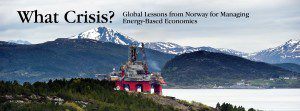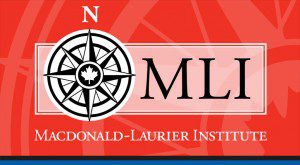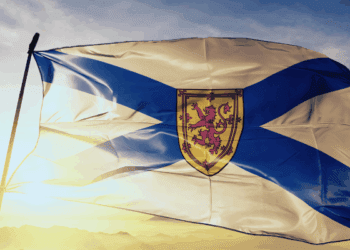Author Greg Poelzer says Canadian governments currently feeling the pinch over sagging oil prices should aim to invest 100 per cent of natural resource revenues in sovereign wealth funds to help spread out the benefits over time
OTTAWA, Feb. 12, 2015 – Canada should follow Norway’s example by taking natural resource revenues out of the hands of free-spending politicians and placing them into investments that can be used over the long-term, a new report from the Macdonald-Laurier Institute finds.
Provincial governments across Canada are currently feeling the pinch as plummeting oil prices put a strain on budgets.
The federal government has taken the unusual step of delaying its budget. Alberta, after violently resisting for decades, even floated the idea of introducing a provincial sales tax.
This volatility would not be nearly as pronounced if Canadian governments had followed Norway in establishing an investment fund, says Greg Poelzer, a University of Saskatchewan professor.
Poelzer, a noted expert on northern governance, is the author of “What Crisis? Global lessons from Norway for managing energy-based economies”.
To read the paper, click here.
The paper makes the case that Canada should invest 100 per cent of its natural resource revenue into sovereign wealth funds – a set of government-owned and managed investments sourced through resource-related taxes and royalties.
“As a country, we have been poor fiscal stewards of our natural resource wealth”, Poelzer writes.
“If Canada is to build stable, powerful and sustainable economies, and to secure our place as an energy and natural resource power globally, the federal government, the provinces and territories need to commit to building SWFs”.
Energy development also plays an important role in Norway but, in contrast to Canada, it has no plans to radically change its budget as a result of the oil crisis. In fact, it has a budgetary buffer of $8.5 billion.
The difference is that, 25 years ago, Norway created a sovereign wealth fund to capture its oil revenues and remove them from general government revenues.
This takes away the temptation for free-spending politicians to use an ephemeral benefit – revenue from natural resources – to plug holes in government budgets brought on by swings in the economy or over-spending.
 Norway’s example contrasts sharply with Alberta’s, Poelzer says.
Norway’s example contrasts sharply with Alberta’s, Poelzer says.
That province established a fund in the 1970s but declined to pay into it with the same zeal. The amount of contributions declined over time and were eventually stopped altogether in 1987.
Norway, on the other hand, deposits all of its revenue from the petroleum sector into the fund; none of it goes into general government revenue. The government is also only allowed to use a portion of the interest it earns on a yearly basis.
As a result, Norway’s fund is now worth $US890 billion. Alberta’s is worth only about $17 billion.
“Norway shows that governments blessed with petroleum resources can build modern, stable, and prosperous economies on the bedrock of oil and gas”, writes Poelzer.
Poelzer says these examples hold several lessons for Canada, including:
- Building gradually over a few decades, the aim should be for 100 per cent of non-renewable resource revenues to be committed to federal and territorial/provincial SWFs;
- Governments should only use the interest and not touch the principal, otherwise governments will overspend, putting programs at even greater risk when resource commodity prices fall, as they always do.
***
Greg Poelzer is the Founding Director and Executive Chair of the University of Saskatchewan International Centre for Northern Governance and Development (ICNGD). He is an Associate Professor of Political Studies and an Associate Member of the schools of Public Policy and Environment and Sustainability at the university. He is widely known as a builder and innovator who has success pulling together Aboriginal organizations, government, and the private sector to develop innovative approaches to education, research, and capacity building.
The Macdonald-Laurier Institute is the only non-partisan, independent national public policy think tank in Ottawa focusing on the full range of issues that fall under the jurisdiction of the federal government. Join us in 2015 as we celebrate our 5th anniversary.
For more information, please contact Mark Brownlee, communications manager, at 613-482-8327 x105 or email at mark.brownlee@macdonaldlaurier.ca.




